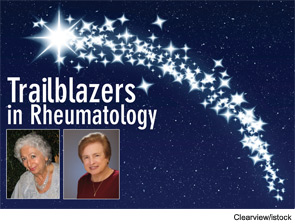
Rodanthi C. Kitridou, MD, & Bevra H. Hahn, MD
Editor’s note: We were sad to learn that Rodanthi C. Kitridou, MD, MACR, passed away July 6, 2023, after a long illness. Dr. Kitridou was the longtime director of clinical rheumatology at at LAC/USC Medical Center in Los Angeles. In an article published in 2011, Dr. Richard Panush said of Dr. Kitridou, “[She] was intense, clinically superb, smart, demanding, commanding and obsessively thorough. Her knowledge of clinical rheumatology was vast and her clinical skills consummate. She was deeply devoted to her patients, with an almost maternal dedication. She would not tolerate her students, residents or fellows not caring as assiduously as she, and woe unto him or her who stinted. She demanded a higher standard. Often was the time when she would seemingly spend hours with a patient, during a busy clinic day, sympathizing, empathizing and displaying an amazing ability to figure out some novel way to help her suffering patients.” Here, we republish a story from 2012 featuring Dr. Kitridou.
Since the beginning of their medical careers, Rodanthi C. Kitridou, MD, and Bevra H. Hahn, MD, have seen a huge shift in the demographics of the field.
“When I came to the United States in 1963 for my residency, the U.S. had few female physicians and even fewer female rheumatologists,” says Dr. Kitridou. “It is remarkable to have seen how the subspecialty has grown through the years.”
In fact, when Drs. Kitridou and Hahn began their careers, only about 7% of physicians were female.1 Today, the number of female physicians has jumped to nearly 30% of the workforce, according to data from the American Medical Association. And the subspecialty of rheumatology has seen an even greater shift in the percentages, with females making up more than 60% of the current rheumatology fellows-in-training, as measured by the National Resident Matching Program. Both Drs. Hahn and Kitridou credit the influx of women entering medicine as the catalyst for gender shift within the subspecialty.
Drs. Hahn and Kitridou have witnessed these tides turn from the beginning. Certainly, their experiences and example can serve as a guide for the next generation, leading the way and setting the tone for future female rheumatologists.
Dr. Kitridou was born in Greece and trained at Hahnemann Medical College and Hospital (now Drexel University). She directed the rheumatology department at Hahnemann for five years, prior to joining the University of Southern California (UCS) as directress of clinical rheumatology, where she eventually became a professor of medicine. Dr. Kitridou has received numerous honors throughout her career, including being elected a master of the ACR in 2003 and receiving the Humanitarian Award of the Lupus Foundation of America, as well as an Honorary Life Membership. She retired from USC in 2008 and now volunteers at the lupus clinic of Los Angeles County + USC Medical Center.
“I chose rheumatology because it was new and exciting,” says Dr. Kitridou. “In medical school, I had precious little exposure to rheumatology. During my residency at Hahnemann, a very inspiring young associate taught rheumatology. That inspired me to pursue this subspecialty.”
“In the early days, there were more traditional notions about women as professionals,” Dr. Kitridou continues. “There were lots of challenges in terms of establishing and building a career. But, even back then, I can give you many examples of wonderful, grateful patients and colleagues who helped me grow as a rheumatologist.”
Dr. Hahn is a professor of medicine and chief of the division of rheumatology at the University of California, Los Angeles (UCLA) David Geffen School of Medicine. Prior to joining UCLA, she served as associate professor of medicine at Washington University in St. Louis. Dr. Hahn received her undergraduate degree from Ohio State University in Columbus and her medical degree from Johns Hopkins University in Baltimore. She completed her internship and rheumatology training at Washington University in St. Louis. Dr. Hahn has served as a volunteer board member of the ACR Research and Education Foundation (REF) and president of the ACR. She was instrumental in the formation of the ACR Women in Rheumatology Subcommittee, and also served on the ACR 75th Anniversary Task Force.
“When I began my career, there was a struggle for acceptance that’s different now,” says Dr. Hahn. “I felt a strong conflict with home obligations and demands at work. It wasn’t accepted then to have a work/life balance. Now, we all strive for balance in life.”
“The growing number of women in rheumatology, and in all of medicine, is changing the way we practice,” Dr. Hahn continues. “Today, we are more interested in balance in our life and working in teams to provide patients with the best care possible.”
Dr. Kitridou adds, “Women are compassionate and adept at building long-term bonds with patients and with their families. I find the relationships we have with our patients’ families to be very rewarding. We work together as a team with the family to bring about success for the patient.”
Advice for the Future Generation
“The sky is the limit today. Learn to listen. We have a tendency as physicians and scientists to rely on labs and imaging findings,” says Dr. Kitridou. “Those are important, but what is sometimes more important is what information comes from the patient. Try to put yourself in your patient’s shoes—the patient knows where the pain and swelling is, what brings on the symptoms, and what provides relief. Listen, listen, listen.”
Dr. Hahn offers this advice: “Recognize your limits and respect them. Take what you do seriously and do your best. Be content with yourself and empowered to say no to things, both personally and professionally.”
Giving Back to the Field
In addition to being highly regarded rheumatologists and rheumatology educators, both Drs. Hahn and Kitridou are long-time supporters of the REF and are currently part of the Founders Circle.
About this commitment to giving, Dr. Kitridou says, “My passion for this most intellectually challenging field fuels my giving. I want rheumatology clinical care, education, and research to be at the highest possible level, so that our patients can benefit.”
To learn more about supporting the REF through our new Journey to Cure campaign, visit www.rheumatology.org/REF.
